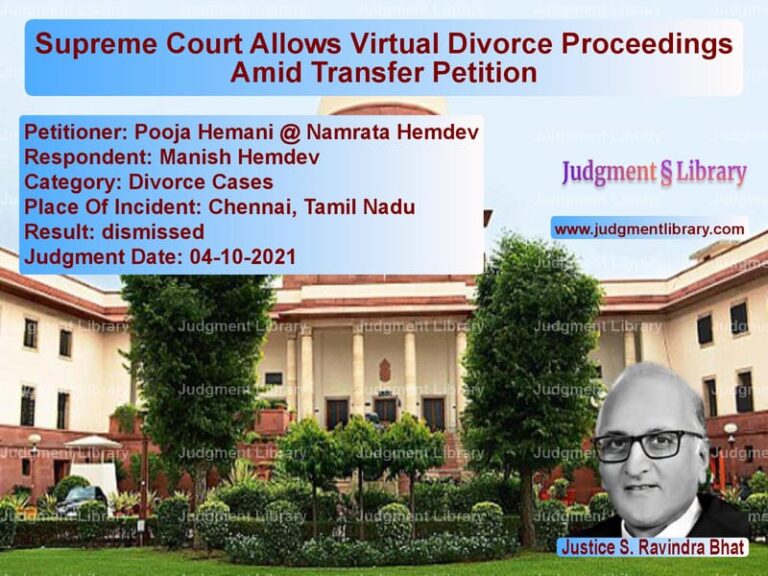Supreme Court Rejects Late Amendment in Property Dispute: Clarifies Due Diligence in Civil Suits
The Supreme Court, in Basavaraj v. Indira & Ors., ruled against a late-stage amendment to a civil suit for partition, emphasizing that amendments cannot be allowed after the trial has commenced unless due diligence is proven. The ruling reinforces the principles of procedural fairness and prevents misuse of amendment provisions to delay litigation.
Background of the Case
The case revolves around a property dispute involving ancestral land in Karnataka. The plaintiffs, Indira and another, filed a suit in 2005 seeking partition of property inherited from their grandfather. While the case was at the final argument stage in 2010, the plaintiffs filed an application to amend the plaint, seeking an additional declaration that an earlier compromise decree, dated October 14, 2004, was null and void. The trial court rejected this request, but the Karnataka High Court overturned the decision, allowing the amendment.
Key Legal Issues
- Whether an amendment can be allowed after the trial has commenced.
- Whether the amendment changed the nature of the original suit.
- Whether the amendment was barred by the limitation period.
Appellant’s (Basavaraj’s) Arguments
- The amendment changed the fundamental nature of the suit from partition to declaration, which is impermissible.
- The compromise decree of 2004 had already been recorded in a separate case, and it could only be challenged in the same court.
- The plaintiffs had been aware of the compromise decree since the start of the case but failed to challenge it in a timely manner.
- The limitation period for challenging a decree is three years under the Limitation Act, 1963. The amendment application was filed more than five years later.
Respondents’ (Plaintiffs’) Arguments
- The failure to challenge the compromise decree earlier was an oversight, not a deliberate omission.
- Allowing the amendment would prevent multiple lawsuits and ensure complete justice.
- The court fee for the additional relief had been paid, demonstrating their bona fide intent.
- No prejudice would be caused to the defendants as the facts were already on record.
Supreme Court’s Observations
The Bench comprising Justices C.T. Ravikumar and Rajesh Bindal analyzed the case and made the following key observations:
- “The amendment seeks to change the suit from partition to declaration, which alters its fundamental character.”
- “Under Order VI Rule 17 CPC, an amendment after the trial begins is permissible only if due diligence is proven. Here, the plaintiffs have merely cited oversight, which is not an acceptable ground.”
- “A compromise decree, once passed, must be challenged in the same court under Order XXIII Rule 3 CPC. It cannot be collaterally attacked through an amendment in another suit.”
- “The limitation period for challenging a decree is three years. The plaintiffs waited more than five years to file the amendment application, making it time-barred.”
Key Legal Findings
- The amendment was filed too late and did not satisfy the due diligence requirement.
- The proposed amendment altered the nature of the case, which is not permitted.
- The challenge to the compromise decree was time-barred under the Limitation Act.
- The plaintiffs had multiple opportunities to seek relief earlier but failed to do so.
Final Judgment
The Supreme Court ruled:
“The impugned judgment of the High Court is set aside. The amendment application is rejected, and the trial court’s original decision is restored.”
The plaintiffs were also ordered to pay costs of ₹1,00,000 to the defendants.
Key Takeaways from the Judgment
- Late amendments in civil suits must demonstrate due diligence to be accepted.
- The nature of a suit cannot be changed through an amendment.
- Challenges to decrees must be made within the prescribed limitation period.
- Courts must prevent amendments that cause prejudice to the opposing party.
Impact of the Judgment
This ruling clarifies the procedural limitations on amendments in civil litigation. The judgment ensures:
- Litigation is not prolonged due to belated amendments.
- Parties must challenge decrees in the appropriate forum and within time limits.
- Trial courts have clear guidance on rejecting amendments that change the nature of a suit.
Conclusion
The Supreme Court’s decision in Basavaraj v. Indira & Ors. strengthens procedural discipline in civil cases by reaffirming the restrictions on amendments. By rejecting the late amendment, the Court has ensured that procedural rules are not misused to delay litigation or alter the character of suits. This ruling serves as an important precedent for future partition and property disputes.
Petitioner Name: Basavaraj.Respondent Name: Indira & Ors..Judgment By: Justice C.T. Ravikumar, Justice Rajesh Bindal.Place Of Incident: Karnataka.Judgment Date: 29-02-2024.
Don’t miss out on the full details! Download the complete judgment in PDF format below and gain valuable insights instantly!
Download Judgment: basavaraj-vs-indira-&-ors.-supreme-court-of-india-judgment-dated-29-02-2024.pdf
Directly Download Judgment: Directly download this Judgment
See all petitions in Property Disputes
See all petitions in Succession and Wills
See all petitions in Judgment by C.T. Ravikumar
See all petitions in Judgment by Rajesh Bindal
See all petitions in allowed
See all petitions in Quashed
See all petitions in supreme court of India judgments February 2024
See all petitions in 2024 judgments
See all posts in Civil Cases Category
See all allowed petitions in Civil Cases Category
See all Dismissed petitions in Civil Cases Category
See all partially allowed petitions in Civil Cases Category







